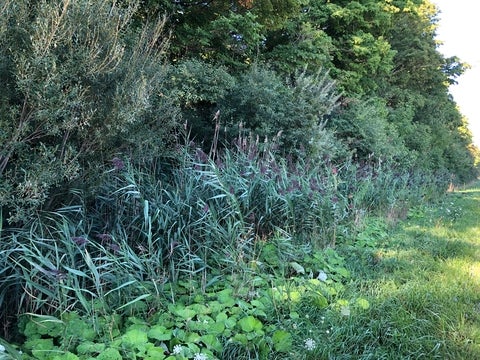Science that matters: Doctoral student researches invasive plant species that threaten wetlands
By Alyana Versolatto
Graduate Recruitment Officer
You have probably seen Phragmites australis in the wild—it’s a tall reed with a purple feathery seed head often found in roadside ditches—but did you know it is Ontario’s worst invasive plant species?
Jersey Fontz, a PhD student in Biology (Water) is conducting her research in Long Point, an area globally recognized for its high biodiversity and is currently under threat by various invasive plant species. Fontz is developing a seed mix that can be used to promote the growth of native species instead of invasive species after invasive species removal. If successful, more native plant species will grow in these wetlands promoting a healthier ecosystem.
Fontz’s work to restore native plant species is important because wetlands are among the top productive ecosystems in the world, storing carbon, improving water quality, and offering flood protection (to name a few benefits). In addition, ecosystem restoration can be costly and pre-emptively limiting the regrowth of invasive species helps reduce costs.
What drew you to the PhD in Biology (Water) program at the University of Waterloo?
I was introduced to Biology professor Dr. Rebecca Rooney through Dr. Michael Arts, a professor from my undergraduate time at Toronto Metropolitan University. After I spoke with Dr. Rooney (now my supervisor) about her research in wetland ecology and the work the Waterloo Wetland Laboratory does concerning invasive plants, I knew Waterloo was where I wanted to be. Dr. Rooney steered my focus toward the interdisciplinary water program as an option for my studies. Being a part of the Collaborative Water Program has helped me meet graduate students who aren’t in my lab or program. It’s been a great exposure to different disciplines, industries and ways of thinking.
What is the working relationship like with your supervisor?
I found a great mentor in Dr. Rooney. Her lab is very open and collaborative which is the type of environment I thrive in. She always encourages me to go above and beyond what’s asked of me. It’s been great having a sense of independence when it comes to my project while also being supported by her expertise. The most impactful part of our working relationship is how mistakes are treated. I’ve made my fair share of mistakes and instead of letting them become a lasting impression, Dr. Rooney gives me the space to grow and learn from them which has made me a better scientist.
What are you looking forward to regarding your studies?
Seeing how my field experiments turn out. I’ve learned again and again that science can be very unpredictable (no matter how prepared you might be). It’s been a good but difficult lesson to learn.
I’m also looking forward to completing my last course Water 602: Integrated Water Management Project, which involves a project focusing on the Grand River Watershed. It’s an opportunity to learn more about the area where I’m living, considering my work takes me far away to the coastline of Lake Erie.
How do you spend your time outside of your studies?
My biggest hobby is trying local restaurants and Waterloo has a great food scene. My favourite spot has been The Cactus, a Mexican restaurant close to campus. I’ve also been enjoying how bike-friendly and scooter-friendly the region is and the many trails available. I’ve met so many kind and supportive people —shout-out to the other members of the Waterloo Wetland Laboratory! Their constant support both in and out of the lab for almost two years has made all the difference.

Jersey Fontz (she/her)
Doctor of Philosophy (PhD) in Biology (Water) student

Phragmites australis in the wild